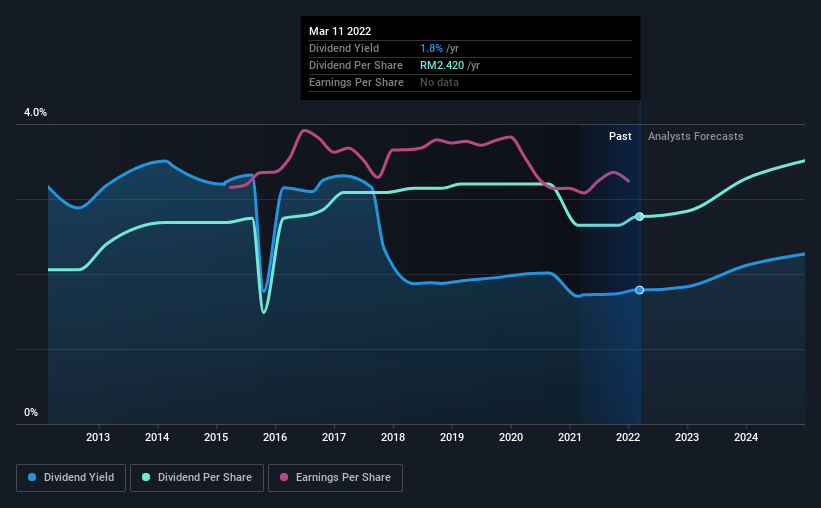Nestlé (Malaysia) Berhad (KLSE:NESTLE) Will Pay A Larger Dividend Than Last Year At RM1.02

Nestlé (Malaysia) Berhad (KLSE:NESTLE) will increase its dividend on the 19th of May to RM1.02. This takes the annual payment to 1.8% of the current stock price, which unfortunately is below what the industry is paying.
See our latest analysis for Nestlé (Malaysia) Berhad
Nestlé (Malaysia) Berhad Is Paying Out More Than It Is Earning
The dividend yield is a little bit low, but sustainability of the payments is also an important part of evaluating an income stock. Based on the last payment, the dividend made up 93% of cash flows, but a higher proportion of net income. The company could be more focused on returning cash to shareholders, but this could indicate that growth opportunities are few and far between.
Earnings per share is forecast to rise by 2.4% over the next year. If the dividend continues on its recent course, the payout ratio in 12 months could be 97%, which is a bit high and could start applying pressure to the balance sheet.

Dividend Volatility
The company has a long dividend track record, but it doesn't look great with cuts in the past. Since 2012, the dividend has gone from RM1.80 to RM2.42. This means that it has been growing its distributions at 3.0% per annum over that time. The dividend has seen some fluctuations in the past, so even though the dividend was raised this year, we should remember that it has been cut in the past.
Nestlé (Malaysia) Berhad May Find It Hard To Grow The Dividend
With a relatively unstable dividend, it's even more important to evaluate if earnings per share is growing, which could point to a growing dividend in the future. It's not great to see that Nestlé (Malaysia) Berhad's earnings per share has fallen at approximately 2.2% per year over the past five years. Declining earnings will inevitably lead to the company paying a lower dividend in line with lower profits. However, the next year is actually looking up, with earnings set to rise. We would just wait until it becomes a pattern before getting too excited.
Nestlé (Malaysia) Berhad's Dividend Doesn't Look Sustainable
In summary, while it's always good to see the dividend being raised, we don't think Nestlé (Malaysia) Berhad's payments are rock solid. The payments are bit high to be considered sustainable, and the track record isn't the best. We would be a touch cautious of relying on this stock primarily for the dividend income.
Investors generally tend to favour companies with a consistent, stable dividend policy as opposed to those operating an irregular one. At the same time, there are other factors our readers should be conscious of before pouring capital into a stock. For instance, we've picked out 1 warning sign for Nestlé (Malaysia) Berhad that investors should take into consideration. If you are a dividend investor, you might also want to look at our curated list of high yield dividend stocks.
Valuation is complex, but we're here to simplify it.
Discover if Nestlé (Malaysia) Berhad might be undervalued or overvalued with our detailed analysis, featuring fair value estimates, potential risks, dividends, insider trades, and its financial condition.
Access Free AnalysisHave feedback on this article? Concerned about the content? Get in touch with us directly. Alternatively, email editorial-team (at) simplywallst.com.
This article by Simply Wall St is general in nature. We provide commentary based on historical data and analyst forecasts only using an unbiased methodology and our articles are not intended to be financial advice. It does not constitute a recommendation to buy or sell any stock, and does not take account of your objectives, or your financial situation. We aim to bring you long-term focused analysis driven by fundamental data. Note that our analysis may not factor in the latest price-sensitive company announcements or qualitative material. Simply Wall St has no position in any stocks mentioned.
About KLSE:NESTLE
Nestlé (Malaysia) Berhad
Manufactures and sells food and beverage products in Malaysia and internationally.
Moderate growth potential with mediocre balance sheet.
Market Insights
Community Narratives


